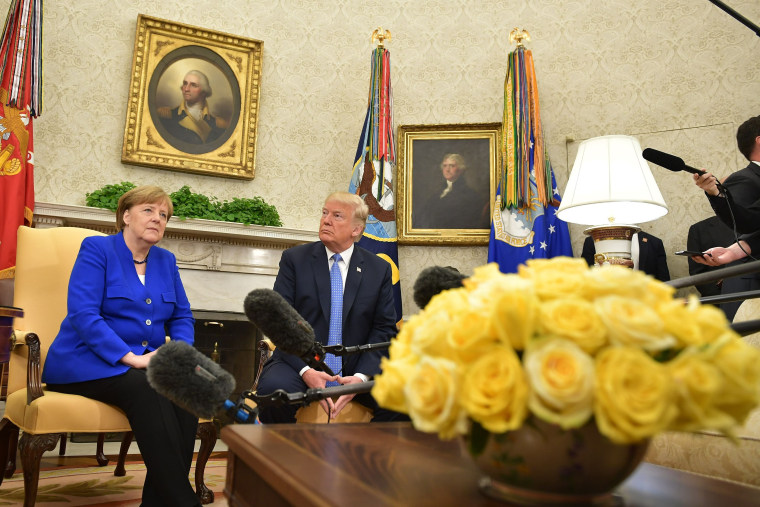During Donald Trump's interview yesterday with Fox News' Laura Ingraham, the president brought up German Chancellor Angela Merkel in passing, which led the host to ask a question I'd wondered about myself.
INGRAHAM: What about her dig at you when she was at Harvard? Was that appropriate?TRUMP: What did she say?
Well, as it turns out, Merkel spoke at Harvard's commencement last week, and much of her speech was devoted to defending principles of respect and inclusion. "Walls of ignorance and narrowmindedness may exist between family members as well as between groups within society, between people of different skin colors, nations and religions," she said. "I would like to see us break down these walls."
Merkel added, "I want to leave this wish with you: Tear down walls of ignorance and narrowmindedness, for nothing has to stay as it is."
When the Fox News host presented Trump with the remarks, the Republican was uncharacteristically restrained. "She has to say what she has to say," he replied.
And while that understated response was a welcome surprise, what I found interesting was the underlying assumption that Merkel had taken a "dig" at Trump in the first place.
The German chancellor did not mention the American president by name, but when we hear references to "walls of ignorance and narrowmindedness," many -- including Trump's likeminded allies -- immediately think of him.
Which is itself quite remarkable, and something that occurs with surprising regularity.
Last fall, for example, during John McCain's memorial services, speaker after speaker took time to celebrate enduring American principles often tied to the late senator -- honor, dignity, character, heroism, a willingness to sacrifice -- many observers were reminded of the fact that no fair-minded observer will ever use such words to describe the current occupant of the Oval Office.
As we discussed at the time, people close to Trump reportedly "fumed" during the event, and "grew angry" in response to veiled criticisms, even when Trump's name went unmentioned.
It wasn't an isolated incident. In 2017, on the 4th of July, NPR published a series of tweets with the text of the Declaration of Independence -- infuriating Trump fans who assumed the phrasing from the document attacking King George III was actually an attack on the current president.
Several months earlier, Barack Obama spoke at an event at Pearl Harbor and told attendees, "Even when hatred burns hottest, even when the tug of tribalism is at its most primal, we must resist the urge to turn inward. We must resist the urge to demonize those who are different." Trump, naturally, assumed the Democratic president was directing the comments at him.
To be sure, there's no need to play games. Was Merkel taking a veiled shot at Trump? Probably. So, too, were many of McCain's eulogists.
But what I find amazing is how effortless it is for practically everyone -- left, right, and center -- to hear descriptions of awful leaders and instinctively assume Trump is the target.
